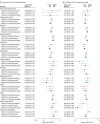Comparison of Medical and Mental Health Sequelae Following Hospitalization for COVID-19, Influenza, and Sepsis
- PMID: 37338892
- PMCID: PMC10282961
- DOI: 10.1001/jamainternmed.2023.2228
Comparison of Medical and Mental Health Sequelae Following Hospitalization for COVID-19, Influenza, and Sepsis
Abstract
Importance: People who survive hospitalization for COVID-19 are at risk for developing new cardiovascular, neurological, mental health, and inflammatory autoimmune conditions. It is unclear how posthospitalization risks for COVID-19 compare with those for other serious infectious illnesses.
Objective: To compare risks of incident cardiovascular, neurological, and mental health conditions and rheumatoid arthritis in 1 year following COVID-19 hospitalization against 3 comparator groups: prepandemic hospitalization for influenza and hospitalization for sepsis before and during the COVID-19 pandemic.
Design, setting, and participants: This population-based cohort study included all adults hospitalized for COVID-19 between April 1, 2020, and October 31, 2021, historical comparator groups of people hospitalized for influenza or sepsis, and a contemporary comparator group of people hospitalized for sepsis in Ontario, Canada.
Exposure: Hospitalization for COVID-19, influenza, or sepsis.
Main outcome and measures: New occurrence of 13 prespecified conditions, including cardiovascular, neurological, and mental health conditions and rheumatoid arthritis, within 1 year of hospitalization.
Results: Of 379 366 included adults (median [IQR] age, 75 [63-85] years; 54% female), there were 26 499 people who survived hospitalization for COVID-19, 299 989 historical controls (17 516 for influenza and 282 473 for sepsis), and 52 878 contemporary controls hospitalized for sepsis. Hospitalization for COVID-19 was associated with an increased 1-year risk of venous thromboembolic disease compared with influenza (adjusted hazard ratio, 1.77; 95% CI, 1.36-2.31) but with no increased risks of developing selected ischemic and nonischemic cerebrovascular and cardiovascular disorders, neurological disorders, rheumatoid arthritis, or mental health conditions compared with influenza or sepsis cohorts.
Conclusions and relevance: In this cohort study, apart from an elevated risk of venous thromboembolism within 1 year, the burden of postacute medical and mental health conditions among those who survived hospitalization for COVID-19 was comparable with other acute infectious illnesses. This suggests that many of the postacute consequences of COVID-19 may be related to the severity of infectious illness necessitating hospitalization rather than being direct consequences of infection with SARS-CoV-2.
Conflict of interest statement
Figures



References
-
- Post COVID-19 condition (long COVID). Public Health Agency of Canada . August 18, 2021. Accessed May 10, 2023. https://www.canada.ca/en/public-health/services/diseases/2019-novel-coro...
-
- COVID-19 rapid guideline: managing the long-term effects of COVID-19. National Institute for Health and Care Excellence (NICE), Scottish Intercollegiate Guidelines Network (SIGN), and Royal College of General Practitioners (RCGP) . March 11, 2022. Accessed May 10, 2023. https://www.nice.org.uk/guidance/ng188/resources/covid19-rapid-guideline...
-
- Long COVID or post-COVID conditions. Centers for Disease Control and Prevention . July 11, 2022. Updated December 16, 2022. Accessed May 10, 2023. https://www.cdc.gov/coronavirus/2019-ncov/long-term-effects/index.html
-
- Bach K. New data shows long Covid is keeping as many as 4 million people out of work. Brookings . August 24, 2022. Accessed May 10, 2023. https://www.brookings.edu/research/new-data-shows-long-covid-is-keeping-...
Publication types
MeSH terms
Grants and funding
LinkOut - more resources
Full Text Sources
Medical
Miscellaneous

